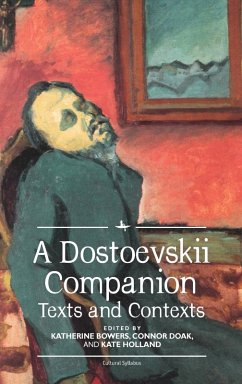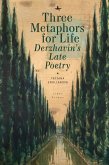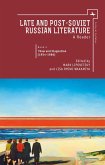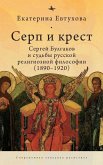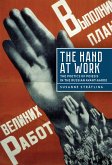A Dostoevskii Companion
Texts and Contexts
Herausgeber: Bowers, Katherine; Holland, Kate; Doak, Connor
A Dostoevskii Companion
Texts and Contexts
Herausgeber: Bowers, Katherine; Holland, Kate; Doak, Connor
- Gebundenes Buch
- Merkliste
- Auf die Merkliste
- Bewerten Bewerten
- Teilen
- Produkt teilen
- Produkterinnerung
- Produkterinnerung
The powerful, impassioned, and often frenetic prose of Fedor Dostoevsky continues to fascinate readers in the twenty-first century. A Dostoevsky Companion aims to help students and readers navigate the writer's fiction and his world, to better understand the cultural and sociopolitical milieu in which Dostoevsky lived and wrote.
Andere Kunden interessierten sich auch für
![Before They Were Titans Before They Were Titans]() Before They Were Titans155,99 €
Before They Were Titans155,99 €![Silent Love Silent Love]() Gerard VriesSilent Love130,99 €
Gerard VriesSilent Love130,99 €![Three Metaphors for Life Three Metaphors for Life]() Tatiana SmoliarovaThree Metaphors for Life129,99 €
Tatiana SmoliarovaThree Metaphors for Life129,99 €![Late and Post Soviet Russian Literature Late and Post Soviet Russian Literature]() Late and Post Soviet Russian Literature144,99 €
Late and Post Soviet Russian Literature144,99 €![Witness and Transformation Witness and Transformation]() Sarah ValentineWitness and Transformation142,99 €
Sarah ValentineWitness and Transformation142,99 €![The Cross & the Sicle The Cross & the Sicle]() Catherine EvtuhovaThe Cross & the Sicle37,99 €
Catherine EvtuhovaThe Cross & the Sicle37,99 €![The Hand at Work The Hand at Work]() Susanne SträtlingThe Hand at Work129,99 €
Susanne SträtlingThe Hand at Work129,99 €-
-
-
The powerful, impassioned, and often frenetic prose of Fedor Dostoevsky continues to fascinate readers in the twenty-first century. A Dostoevsky Companion aims to help students and readers navigate the writer's fiction and his world, to better understand the cultural and sociopolitical milieu in which Dostoevsky lived and wrote.
Hinweis: Dieser Artikel kann nur an eine deutsche Lieferadresse ausgeliefert werden.
Hinweis: Dieser Artikel kann nur an eine deutsche Lieferadresse ausgeliefert werden.
Produktdetails
- Produktdetails
- Verlag: Academic Studies Press
- Seitenzahl: 556
- Erscheinungstermin: 9. November 2018
- Englisch
- Abmessung: 234mm x 156mm x 30mm
- Gewicht: 948g
- ISBN-13: 9781618117267
- ISBN-10: 1618117262
- Artikelnr.: 53021458
- Herstellerkennzeichnung
- Libri GmbH
- Europaallee 1
- 36244 Bad Hersfeld
- gpsr@libri.de
- Verlag: Academic Studies Press
- Seitenzahl: 556
- Erscheinungstermin: 9. November 2018
- Englisch
- Abmessung: 234mm x 156mm x 30mm
- Gewicht: 948g
- ISBN-13: 9781618117267
- ISBN-10: 1618117262
- Artikelnr.: 53021458
- Herstellerkennzeichnung
- Libri GmbH
- Europaallee 1
- 36244 Bad Hersfeld
- gpsr@libri.de
Katherine Bowers is an Assistant Professor of Slavic Studies at the University of British Columbia. A specialist in nineteenth-century Russian literature and culture, she is currently completing a monograph about gothic fiction¿s influence on Russian realism. Connor Doak is a lecturer in Russian at the University of Bristol. He works primarily on nineteenth- and twentieth-century Russian literature, with a special interest in gender and sexuality in Russian culture. He has authored articles on authors including Dostoevsky, Chekhov, Petrushevskaia and Pushkin, and is currently working on a study of masculinity in Maiakovsky¿s poetry. Kate Holland is Associate Professor of Russian Literature at the University of Toronto. She is the author of the monograph, The Novel in the Age of Disintegration: Dostoevsky and the Problem of Genre in the 1870s (2013), as well as articles on Dostoevsky, Tolstoy, Herzen, Saltykov-Shchedrin and Veselovsky.
Acknowledgments How to Use this Book Note on Translation, Transliteration, and Referencing Timeline of Dostoevskii
s Life and Works Biography and Context Chapter 1: The Early Dostoevskii Introduction
A Noble Vocation
(2012) by Robert Bird The Ribbon Theft Incident from Confessions (1789) by Jean-Jacques Rousseau A Son
s Revenge from The Robbers (1781) by Friedrich Schiller First Glimpse of Udolpho (1794) by Ann Radcliffe The House of Monsieur Grandet in Eugénie Grandet (1833) by Honoré de Balzac Little Nell in The Old Curiosity Shop (1841) by Charles Dickens The Overcoat (1842) by Nikolai Gogol
Poor Folk (1846) by Fedor Dostoevskii First Night from
White Nights
(1848) by Fedor Dostoevskii Letter to Gogol
(1847) by Vissarion Belinskii Three Documents from the Petrashevskii Trial (1849) The Mock Execution: Letter to Mikhail Dostoevskii, December 22, 1849 by Fedor Dostoevskii Chapter 2: Dostoevskii and His Contemporaries Introduction A Review of The Double (1846) by Vissarion Belinskii Thoughts on The Double (1847) by Valerian Maikov The Row with Turgenev: Letter to Apollon Maikov, August 16, 1867 by Fedor Dostoevskii The Caricature of Turgenev in Demons (1872) by Fedor Dostoevskii Reaction to Demons: Letter to Mariia Miliutina, December 3, 1872 by Ivan Turgenev
Landowners
Literature
: Letter to Nikolai Strakhov, May 18, 1871 by Fedor Dostoevskii Thoughts on Anna Karenina (1877) by Fedor Dostoevskii Tiny Alterations of Consciousness (1890) by Lev Tolstoy From A Cruel Talent (1882) by Nikolai Mikhailovskii Tolstoy and Dostoevskii (1902) by Dmitrii Merezhkovskii The Root and the Flower: Dostoevskii and Turgenev (1993) by Robert Louis Jackson Poetics Chapter 3: Aesthetics Introduction Mr.
bov and the Question of Art (1861) by Fedor Dostoevskii The Defense of the Ideal: Letter to Apollon Maikov, December 11, 1868 by Fedor Dostoevskii Apropos of the Exhibition (1873) by Fedor Dostoevskii Poet of the Underground (1875) by Fedor Dostoevskii Dmitrii Karamazov on Beauty (1878) by Fedor Dostoevskii Two Kinds of Beauty (1966) by Robert Louis Jackson Dostoevskii
s Fantastic Pages (2006) by Vladimir Zakharov Chapter 4: Characters Introduction Makar Devushkin (2009) by Carol Apollonio Underground Man (1963) by Mikhail Bakhtin Raskol
nikov (2002) by Konstantine Klioutchkine Myshkin (1998) by Liza Knapp Nastas
ia Filippovna (2004) by Sarah J. Young Stavrogin (1969) by Joseph Frank Fedor Karamazov (2003) by Deborah A. Martinsen Ivan Karamazov and Smerdiakov (1992) by Harriet Murav Alesha Karamazov (1977) by Valentina Vetlovskaia Chapter 5: The Novel Introduction A Novel of Disintegration from the Notebooks for The Adolescent (1874) by Fedor Dostoevskii An Exceptional Family from The Adolescent (1875) by Fedor Dostoevskii Remaking the Noble Family Novel (2013) by Kate Holland A New Kind of Hero (1963) by Mikhail Bakhtin
Chronicle Time
in Dostoevskii (1979) by Dmitrii Likhachev The Narrator of The Idiot (1981) by Robin Feuer Miller Sideshadowing in Dostoevskii
s Novels (1994) by Gary Saul Morson The Plot of Crime and Punishment (2016) by Robert L. Belknap Chapter 6: From Journalism to Fiction Introduction Feuilleton, April 22, 1847 by Fedor Dostoevskii The Petersburg Feuilletons (1979) by Joseph Frank Dostoevskii
s
Vision on the Nevä (1979) by Joseph Frank Excerpts from the Notebooks for The Idiot (1867) by Fedor Dostoevskii Nastas
ia Filippovnäs History from The Idiot (1869) by Fedor Dostoevskii Ol
ga Umetskaia and The Idiot (2017) by Katherine Bowers Two Suicides from A Writer
s Diary (1876) by Fedor Dostoevskii From
The Meek One: A Fantastic Story
(1876) by Fedor Dostoevskii A Case Study: October, November, December 1876 (2013) by Kate Holland A Writer
s Diary as a Historical Phenomenon (2004) by Igor
Volgin A Writer
s Diary, April 1877 issue in full Themes Chapter 7: Captivity, Free Will, and Utopia Introduction Dostoevskii
s Prison Years (2013) by James P. Scanlan Prison Life: Letter to Mikhail Dostoevskii, February 22, 1854 by Fedor Dostoevskii The Prison from Notes from the House of the Dead (1862) by Fedor Dostoevskii The Eagle from Notes from the House of the Dead (1862) by Fedor Dostoevskii Dostoevskii Responds to the Censorship Committee (1986) by Joseph Frank Vera Pavlovnäs Fourth Dream from What Is to Be Done? (1863) by Nikolai Chernyshevskii The Prison of Utopia (1986) by Joseph Frank The Crystal Palace from Notes from Underground (1864) by Fedor Dostoevskii Twice Two from Notes from Underground (1864) by Fedor Dostoevskii Philosophical Pro et Contra in Part I of Crime and Punishment (1981) by Robert Louis Jackson Meta-utopia (1981) by Gary Saul Morson A Note on His Wife
s Death (1864) by Fedor Dostoevskii The Speech at the Stone from Brothers Karamazov (1880) by Fedor Dostoevskii Ode to Joy (2004) by Robert Louis Jackson Chapter 8: Dostoevskii
s Others Introduction Portrait of Alei in Notes from the House of the Dead (1862) by Fedor Dostoevskii Portrait of Isai Fomich in Notes from the House of the Dead (1862) by Fedor Dostoevskii The Jewish Question (1877) by Fedor Dostoevskii Christians, Muslims, and Jews in Notes from the House of the Dead (2008) by Susan McReynolds From
A Few Words about George Sand
(1876) by Fedor Dostoevskii From
About Women Again
(1876) by Fedor Dostoevskii The Woman Question in Crime and Punishment (1994) by Nina Pelikan Straus The Mothers Karamazov (2009) by Carol Apollonio Chapter 9: Russia Introduction Fellow Convicts from Notes from the House of the Dead (1862) by Fedor Dostoevskii After the Emancipation (1860) by Fedor Dostoevskii Going Beyond Theory (1862) by Fedor Dostoevskii Dostoevskii and the Slavophiles (2003) by Sarah Hudspith The Coming Apocalypse from the Notebooks for Demons (1870) by Fedor Dostoevskii Peasant Marei (1876) by Fedor Dostoevskii Pushkin Speech (1880) by Fedor Dostoevskii Chapter 10: God Introduction A Confession of Faith: Letter to Natal
ia Fonvizina, early March 1854 by Fedor Dostoevskii Myshkin and Rogozhin Exchange Crosses in The Idiot (1869) by Fedor Dostoevskii Dostoevskii
s Religious Thought (1903) by Lev Shestov On the Grand Inquisitor (1921) by Nikolai Berdiaev Hagiography in Brothers Karamazov (1985) by Nina Perlina On the Koranic Motif in The Idiot and Demons (2012) by Diane Oenning Thompson From Dostoevskii
s Religion (2005) by Steven Cassedy Index
s Life and Works Biography and Context Chapter 1: The Early Dostoevskii Introduction
A Noble Vocation
(2012) by Robert Bird The Ribbon Theft Incident from Confessions (1789) by Jean-Jacques Rousseau A Son
s Revenge from The Robbers (1781) by Friedrich Schiller First Glimpse of Udolpho (1794) by Ann Radcliffe The House of Monsieur Grandet in Eugénie Grandet (1833) by Honoré de Balzac Little Nell in The Old Curiosity Shop (1841) by Charles Dickens The Overcoat (1842) by Nikolai Gogol
Poor Folk (1846) by Fedor Dostoevskii First Night from
White Nights
(1848) by Fedor Dostoevskii Letter to Gogol
(1847) by Vissarion Belinskii Three Documents from the Petrashevskii Trial (1849) The Mock Execution: Letter to Mikhail Dostoevskii, December 22, 1849 by Fedor Dostoevskii Chapter 2: Dostoevskii and His Contemporaries Introduction A Review of The Double (1846) by Vissarion Belinskii Thoughts on The Double (1847) by Valerian Maikov The Row with Turgenev: Letter to Apollon Maikov, August 16, 1867 by Fedor Dostoevskii The Caricature of Turgenev in Demons (1872) by Fedor Dostoevskii Reaction to Demons: Letter to Mariia Miliutina, December 3, 1872 by Ivan Turgenev
Landowners
Literature
: Letter to Nikolai Strakhov, May 18, 1871 by Fedor Dostoevskii Thoughts on Anna Karenina (1877) by Fedor Dostoevskii Tiny Alterations of Consciousness (1890) by Lev Tolstoy From A Cruel Talent (1882) by Nikolai Mikhailovskii Tolstoy and Dostoevskii (1902) by Dmitrii Merezhkovskii The Root and the Flower: Dostoevskii and Turgenev (1993) by Robert Louis Jackson Poetics Chapter 3: Aesthetics Introduction Mr.
bov and the Question of Art (1861) by Fedor Dostoevskii The Defense of the Ideal: Letter to Apollon Maikov, December 11, 1868 by Fedor Dostoevskii Apropos of the Exhibition (1873) by Fedor Dostoevskii Poet of the Underground (1875) by Fedor Dostoevskii Dmitrii Karamazov on Beauty (1878) by Fedor Dostoevskii Two Kinds of Beauty (1966) by Robert Louis Jackson Dostoevskii
s Fantastic Pages (2006) by Vladimir Zakharov Chapter 4: Characters Introduction Makar Devushkin (2009) by Carol Apollonio Underground Man (1963) by Mikhail Bakhtin Raskol
nikov (2002) by Konstantine Klioutchkine Myshkin (1998) by Liza Knapp Nastas
ia Filippovna (2004) by Sarah J. Young Stavrogin (1969) by Joseph Frank Fedor Karamazov (2003) by Deborah A. Martinsen Ivan Karamazov and Smerdiakov (1992) by Harriet Murav Alesha Karamazov (1977) by Valentina Vetlovskaia Chapter 5: The Novel Introduction A Novel of Disintegration from the Notebooks for The Adolescent (1874) by Fedor Dostoevskii An Exceptional Family from The Adolescent (1875) by Fedor Dostoevskii Remaking the Noble Family Novel (2013) by Kate Holland A New Kind of Hero (1963) by Mikhail Bakhtin
Chronicle Time
in Dostoevskii (1979) by Dmitrii Likhachev The Narrator of The Idiot (1981) by Robin Feuer Miller Sideshadowing in Dostoevskii
s Novels (1994) by Gary Saul Morson The Plot of Crime and Punishment (2016) by Robert L. Belknap Chapter 6: From Journalism to Fiction Introduction Feuilleton, April 22, 1847 by Fedor Dostoevskii The Petersburg Feuilletons (1979) by Joseph Frank Dostoevskii
s
Vision on the Nevä (1979) by Joseph Frank Excerpts from the Notebooks for The Idiot (1867) by Fedor Dostoevskii Nastas
ia Filippovnäs History from The Idiot (1869) by Fedor Dostoevskii Ol
ga Umetskaia and The Idiot (2017) by Katherine Bowers Two Suicides from A Writer
s Diary (1876) by Fedor Dostoevskii From
The Meek One: A Fantastic Story
(1876) by Fedor Dostoevskii A Case Study: October, November, December 1876 (2013) by Kate Holland A Writer
s Diary as a Historical Phenomenon (2004) by Igor
Volgin A Writer
s Diary, April 1877 issue in full Themes Chapter 7: Captivity, Free Will, and Utopia Introduction Dostoevskii
s Prison Years (2013) by James P. Scanlan Prison Life: Letter to Mikhail Dostoevskii, February 22, 1854 by Fedor Dostoevskii The Prison from Notes from the House of the Dead (1862) by Fedor Dostoevskii The Eagle from Notes from the House of the Dead (1862) by Fedor Dostoevskii Dostoevskii Responds to the Censorship Committee (1986) by Joseph Frank Vera Pavlovnäs Fourth Dream from What Is to Be Done? (1863) by Nikolai Chernyshevskii The Prison of Utopia (1986) by Joseph Frank The Crystal Palace from Notes from Underground (1864) by Fedor Dostoevskii Twice Two from Notes from Underground (1864) by Fedor Dostoevskii Philosophical Pro et Contra in Part I of Crime and Punishment (1981) by Robert Louis Jackson Meta-utopia (1981) by Gary Saul Morson A Note on His Wife
s Death (1864) by Fedor Dostoevskii The Speech at the Stone from Brothers Karamazov (1880) by Fedor Dostoevskii Ode to Joy (2004) by Robert Louis Jackson Chapter 8: Dostoevskii
s Others Introduction Portrait of Alei in Notes from the House of the Dead (1862) by Fedor Dostoevskii Portrait of Isai Fomich in Notes from the House of the Dead (1862) by Fedor Dostoevskii The Jewish Question (1877) by Fedor Dostoevskii Christians, Muslims, and Jews in Notes from the House of the Dead (2008) by Susan McReynolds From
A Few Words about George Sand
(1876) by Fedor Dostoevskii From
About Women Again
(1876) by Fedor Dostoevskii The Woman Question in Crime and Punishment (1994) by Nina Pelikan Straus The Mothers Karamazov (2009) by Carol Apollonio Chapter 9: Russia Introduction Fellow Convicts from Notes from the House of the Dead (1862) by Fedor Dostoevskii After the Emancipation (1860) by Fedor Dostoevskii Going Beyond Theory (1862) by Fedor Dostoevskii Dostoevskii and the Slavophiles (2003) by Sarah Hudspith The Coming Apocalypse from the Notebooks for Demons (1870) by Fedor Dostoevskii Peasant Marei (1876) by Fedor Dostoevskii Pushkin Speech (1880) by Fedor Dostoevskii Chapter 10: God Introduction A Confession of Faith: Letter to Natal
ia Fonvizina, early March 1854 by Fedor Dostoevskii Myshkin and Rogozhin Exchange Crosses in The Idiot (1869) by Fedor Dostoevskii Dostoevskii
s Religious Thought (1903) by Lev Shestov On the Grand Inquisitor (1921) by Nikolai Berdiaev Hagiography in Brothers Karamazov (1985) by Nina Perlina On the Koranic Motif in The Idiot and Demons (2012) by Diane Oenning Thompson From Dostoevskii
s Religion (2005) by Steven Cassedy Index
Acknowledgments How to Use this Book Note on Translation, Transliteration, and Referencing Timeline of Dostoevskii
s Life and Works Biography and Context Chapter 1: The Early Dostoevskii Introduction
A Noble Vocation
(2012) by Robert Bird The Ribbon Theft Incident from Confessions (1789) by Jean-Jacques Rousseau A Son
s Revenge from The Robbers (1781) by Friedrich Schiller First Glimpse of Udolpho (1794) by Ann Radcliffe The House of Monsieur Grandet in Eugénie Grandet (1833) by Honoré de Balzac Little Nell in The Old Curiosity Shop (1841) by Charles Dickens The Overcoat (1842) by Nikolai Gogol
Poor Folk (1846) by Fedor Dostoevskii First Night from
White Nights
(1848) by Fedor Dostoevskii Letter to Gogol
(1847) by Vissarion Belinskii Three Documents from the Petrashevskii Trial (1849) The Mock Execution: Letter to Mikhail Dostoevskii, December 22, 1849 by Fedor Dostoevskii Chapter 2: Dostoevskii and His Contemporaries Introduction A Review of The Double (1846) by Vissarion Belinskii Thoughts on The Double (1847) by Valerian Maikov The Row with Turgenev: Letter to Apollon Maikov, August 16, 1867 by Fedor Dostoevskii The Caricature of Turgenev in Demons (1872) by Fedor Dostoevskii Reaction to Demons: Letter to Mariia Miliutina, December 3, 1872 by Ivan Turgenev
Landowners
Literature
: Letter to Nikolai Strakhov, May 18, 1871 by Fedor Dostoevskii Thoughts on Anna Karenina (1877) by Fedor Dostoevskii Tiny Alterations of Consciousness (1890) by Lev Tolstoy From A Cruel Talent (1882) by Nikolai Mikhailovskii Tolstoy and Dostoevskii (1902) by Dmitrii Merezhkovskii The Root and the Flower: Dostoevskii and Turgenev (1993) by Robert Louis Jackson Poetics Chapter 3: Aesthetics Introduction Mr.
bov and the Question of Art (1861) by Fedor Dostoevskii The Defense of the Ideal: Letter to Apollon Maikov, December 11, 1868 by Fedor Dostoevskii Apropos of the Exhibition (1873) by Fedor Dostoevskii Poet of the Underground (1875) by Fedor Dostoevskii Dmitrii Karamazov on Beauty (1878) by Fedor Dostoevskii Two Kinds of Beauty (1966) by Robert Louis Jackson Dostoevskii
s Fantastic Pages (2006) by Vladimir Zakharov Chapter 4: Characters Introduction Makar Devushkin (2009) by Carol Apollonio Underground Man (1963) by Mikhail Bakhtin Raskol
nikov (2002) by Konstantine Klioutchkine Myshkin (1998) by Liza Knapp Nastas
ia Filippovna (2004) by Sarah J. Young Stavrogin (1969) by Joseph Frank Fedor Karamazov (2003) by Deborah A. Martinsen Ivan Karamazov and Smerdiakov (1992) by Harriet Murav Alesha Karamazov (1977) by Valentina Vetlovskaia Chapter 5: The Novel Introduction A Novel of Disintegration from the Notebooks for The Adolescent (1874) by Fedor Dostoevskii An Exceptional Family from The Adolescent (1875) by Fedor Dostoevskii Remaking the Noble Family Novel (2013) by Kate Holland A New Kind of Hero (1963) by Mikhail Bakhtin
Chronicle Time
in Dostoevskii (1979) by Dmitrii Likhachev The Narrator of The Idiot (1981) by Robin Feuer Miller Sideshadowing in Dostoevskii
s Novels (1994) by Gary Saul Morson The Plot of Crime and Punishment (2016) by Robert L. Belknap Chapter 6: From Journalism to Fiction Introduction Feuilleton, April 22, 1847 by Fedor Dostoevskii The Petersburg Feuilletons (1979) by Joseph Frank Dostoevskii
s
Vision on the Nevä (1979) by Joseph Frank Excerpts from the Notebooks for The Idiot (1867) by Fedor Dostoevskii Nastas
ia Filippovnäs History from The Idiot (1869) by Fedor Dostoevskii Ol
ga Umetskaia and The Idiot (2017) by Katherine Bowers Two Suicides from A Writer
s Diary (1876) by Fedor Dostoevskii From
The Meek One: A Fantastic Story
(1876) by Fedor Dostoevskii A Case Study: October, November, December 1876 (2013) by Kate Holland A Writer
s Diary as a Historical Phenomenon (2004) by Igor
Volgin A Writer
s Diary, April 1877 issue in full Themes Chapter 7: Captivity, Free Will, and Utopia Introduction Dostoevskii
s Prison Years (2013) by James P. Scanlan Prison Life: Letter to Mikhail Dostoevskii, February 22, 1854 by Fedor Dostoevskii The Prison from Notes from the House of the Dead (1862) by Fedor Dostoevskii The Eagle from Notes from the House of the Dead (1862) by Fedor Dostoevskii Dostoevskii Responds to the Censorship Committee (1986) by Joseph Frank Vera Pavlovnäs Fourth Dream from What Is to Be Done? (1863) by Nikolai Chernyshevskii The Prison of Utopia (1986) by Joseph Frank The Crystal Palace from Notes from Underground (1864) by Fedor Dostoevskii Twice Two from Notes from Underground (1864) by Fedor Dostoevskii Philosophical Pro et Contra in Part I of Crime and Punishment (1981) by Robert Louis Jackson Meta-utopia (1981) by Gary Saul Morson A Note on His Wife
s Death (1864) by Fedor Dostoevskii The Speech at the Stone from Brothers Karamazov (1880) by Fedor Dostoevskii Ode to Joy (2004) by Robert Louis Jackson Chapter 8: Dostoevskii
s Others Introduction Portrait of Alei in Notes from the House of the Dead (1862) by Fedor Dostoevskii Portrait of Isai Fomich in Notes from the House of the Dead (1862) by Fedor Dostoevskii The Jewish Question (1877) by Fedor Dostoevskii Christians, Muslims, and Jews in Notes from the House of the Dead (2008) by Susan McReynolds From
A Few Words about George Sand
(1876) by Fedor Dostoevskii From
About Women Again
(1876) by Fedor Dostoevskii The Woman Question in Crime and Punishment (1994) by Nina Pelikan Straus The Mothers Karamazov (2009) by Carol Apollonio Chapter 9: Russia Introduction Fellow Convicts from Notes from the House of the Dead (1862) by Fedor Dostoevskii After the Emancipation (1860) by Fedor Dostoevskii Going Beyond Theory (1862) by Fedor Dostoevskii Dostoevskii and the Slavophiles (2003) by Sarah Hudspith The Coming Apocalypse from the Notebooks for Demons (1870) by Fedor Dostoevskii Peasant Marei (1876) by Fedor Dostoevskii Pushkin Speech (1880) by Fedor Dostoevskii Chapter 10: God Introduction A Confession of Faith: Letter to Natal
ia Fonvizina, early March 1854 by Fedor Dostoevskii Myshkin and Rogozhin Exchange Crosses in The Idiot (1869) by Fedor Dostoevskii Dostoevskii
s Religious Thought (1903) by Lev Shestov On the Grand Inquisitor (1921) by Nikolai Berdiaev Hagiography in Brothers Karamazov (1985) by Nina Perlina On the Koranic Motif in The Idiot and Demons (2012) by Diane Oenning Thompson From Dostoevskii
s Religion (2005) by Steven Cassedy Index
s Life and Works Biography and Context Chapter 1: The Early Dostoevskii Introduction
A Noble Vocation
(2012) by Robert Bird The Ribbon Theft Incident from Confessions (1789) by Jean-Jacques Rousseau A Son
s Revenge from The Robbers (1781) by Friedrich Schiller First Glimpse of Udolpho (1794) by Ann Radcliffe The House of Monsieur Grandet in Eugénie Grandet (1833) by Honoré de Balzac Little Nell in The Old Curiosity Shop (1841) by Charles Dickens The Overcoat (1842) by Nikolai Gogol
Poor Folk (1846) by Fedor Dostoevskii First Night from
White Nights
(1848) by Fedor Dostoevskii Letter to Gogol
(1847) by Vissarion Belinskii Three Documents from the Petrashevskii Trial (1849) The Mock Execution: Letter to Mikhail Dostoevskii, December 22, 1849 by Fedor Dostoevskii Chapter 2: Dostoevskii and His Contemporaries Introduction A Review of The Double (1846) by Vissarion Belinskii Thoughts on The Double (1847) by Valerian Maikov The Row with Turgenev: Letter to Apollon Maikov, August 16, 1867 by Fedor Dostoevskii The Caricature of Turgenev in Demons (1872) by Fedor Dostoevskii Reaction to Demons: Letter to Mariia Miliutina, December 3, 1872 by Ivan Turgenev
Landowners
Literature
: Letter to Nikolai Strakhov, May 18, 1871 by Fedor Dostoevskii Thoughts on Anna Karenina (1877) by Fedor Dostoevskii Tiny Alterations of Consciousness (1890) by Lev Tolstoy From A Cruel Talent (1882) by Nikolai Mikhailovskii Tolstoy and Dostoevskii (1902) by Dmitrii Merezhkovskii The Root and the Flower: Dostoevskii and Turgenev (1993) by Robert Louis Jackson Poetics Chapter 3: Aesthetics Introduction Mr.
bov and the Question of Art (1861) by Fedor Dostoevskii The Defense of the Ideal: Letter to Apollon Maikov, December 11, 1868 by Fedor Dostoevskii Apropos of the Exhibition (1873) by Fedor Dostoevskii Poet of the Underground (1875) by Fedor Dostoevskii Dmitrii Karamazov on Beauty (1878) by Fedor Dostoevskii Two Kinds of Beauty (1966) by Robert Louis Jackson Dostoevskii
s Fantastic Pages (2006) by Vladimir Zakharov Chapter 4: Characters Introduction Makar Devushkin (2009) by Carol Apollonio Underground Man (1963) by Mikhail Bakhtin Raskol
nikov (2002) by Konstantine Klioutchkine Myshkin (1998) by Liza Knapp Nastas
ia Filippovna (2004) by Sarah J. Young Stavrogin (1969) by Joseph Frank Fedor Karamazov (2003) by Deborah A. Martinsen Ivan Karamazov and Smerdiakov (1992) by Harriet Murav Alesha Karamazov (1977) by Valentina Vetlovskaia Chapter 5: The Novel Introduction A Novel of Disintegration from the Notebooks for The Adolescent (1874) by Fedor Dostoevskii An Exceptional Family from The Adolescent (1875) by Fedor Dostoevskii Remaking the Noble Family Novel (2013) by Kate Holland A New Kind of Hero (1963) by Mikhail Bakhtin
Chronicle Time
in Dostoevskii (1979) by Dmitrii Likhachev The Narrator of The Idiot (1981) by Robin Feuer Miller Sideshadowing in Dostoevskii
s Novels (1994) by Gary Saul Morson The Plot of Crime and Punishment (2016) by Robert L. Belknap Chapter 6: From Journalism to Fiction Introduction Feuilleton, April 22, 1847 by Fedor Dostoevskii The Petersburg Feuilletons (1979) by Joseph Frank Dostoevskii
s
Vision on the Nevä (1979) by Joseph Frank Excerpts from the Notebooks for The Idiot (1867) by Fedor Dostoevskii Nastas
ia Filippovnäs History from The Idiot (1869) by Fedor Dostoevskii Ol
ga Umetskaia and The Idiot (2017) by Katherine Bowers Two Suicides from A Writer
s Diary (1876) by Fedor Dostoevskii From
The Meek One: A Fantastic Story
(1876) by Fedor Dostoevskii A Case Study: October, November, December 1876 (2013) by Kate Holland A Writer
s Diary as a Historical Phenomenon (2004) by Igor
Volgin A Writer
s Diary, April 1877 issue in full Themes Chapter 7: Captivity, Free Will, and Utopia Introduction Dostoevskii
s Prison Years (2013) by James P. Scanlan Prison Life: Letter to Mikhail Dostoevskii, February 22, 1854 by Fedor Dostoevskii The Prison from Notes from the House of the Dead (1862) by Fedor Dostoevskii The Eagle from Notes from the House of the Dead (1862) by Fedor Dostoevskii Dostoevskii Responds to the Censorship Committee (1986) by Joseph Frank Vera Pavlovnäs Fourth Dream from What Is to Be Done? (1863) by Nikolai Chernyshevskii The Prison of Utopia (1986) by Joseph Frank The Crystal Palace from Notes from Underground (1864) by Fedor Dostoevskii Twice Two from Notes from Underground (1864) by Fedor Dostoevskii Philosophical Pro et Contra in Part I of Crime and Punishment (1981) by Robert Louis Jackson Meta-utopia (1981) by Gary Saul Morson A Note on His Wife
s Death (1864) by Fedor Dostoevskii The Speech at the Stone from Brothers Karamazov (1880) by Fedor Dostoevskii Ode to Joy (2004) by Robert Louis Jackson Chapter 8: Dostoevskii
s Others Introduction Portrait of Alei in Notes from the House of the Dead (1862) by Fedor Dostoevskii Portrait of Isai Fomich in Notes from the House of the Dead (1862) by Fedor Dostoevskii The Jewish Question (1877) by Fedor Dostoevskii Christians, Muslims, and Jews in Notes from the House of the Dead (2008) by Susan McReynolds From
A Few Words about George Sand
(1876) by Fedor Dostoevskii From
About Women Again
(1876) by Fedor Dostoevskii The Woman Question in Crime and Punishment (1994) by Nina Pelikan Straus The Mothers Karamazov (2009) by Carol Apollonio Chapter 9: Russia Introduction Fellow Convicts from Notes from the House of the Dead (1862) by Fedor Dostoevskii After the Emancipation (1860) by Fedor Dostoevskii Going Beyond Theory (1862) by Fedor Dostoevskii Dostoevskii and the Slavophiles (2003) by Sarah Hudspith The Coming Apocalypse from the Notebooks for Demons (1870) by Fedor Dostoevskii Peasant Marei (1876) by Fedor Dostoevskii Pushkin Speech (1880) by Fedor Dostoevskii Chapter 10: God Introduction A Confession of Faith: Letter to Natal
ia Fonvizina, early March 1854 by Fedor Dostoevskii Myshkin and Rogozhin Exchange Crosses in The Idiot (1869) by Fedor Dostoevskii Dostoevskii
s Religious Thought (1903) by Lev Shestov On the Grand Inquisitor (1921) by Nikolai Berdiaev Hagiography in Brothers Karamazov (1985) by Nina Perlina On the Koranic Motif in The Idiot and Demons (2012) by Diane Oenning Thompson From Dostoevskii
s Religion (2005) by Steven Cassedy Index

